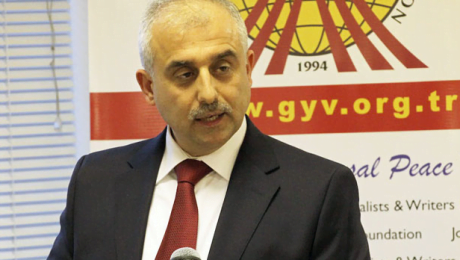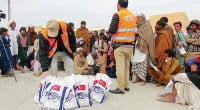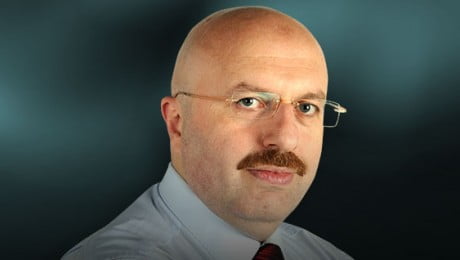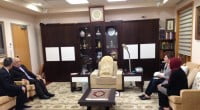Keyword: Hizmet (Gulen) movement

Gülen-linked journalist association warns that movement’s support for gov’t can end
Erdoğan and his supporters have cast the corruption probe as a smear campaign devised by Gülen, who exercises broad, if covert, influence in the media and judiciary through his followers. In response, the government has staged an unprecedented purge of the police forces and has moved to increase its control over the judiciary. Yeşil said that all these allegations were unfounded.

Hizmet, Erdoğan and the US
Today, the government resorts to irrational conspiracy theories in an effort to divert public attention from allegations of corruption. As a social movement that successfully promotes Turkey’s values in its schools in about 150 countries around the world, the Hizmet movement’s patriotism cannot be doubted

People happy in town Kimse Yok Mu helped build
Kimse Yok Mu has been operating in Pakistan since October 2005, when an earthquake devastated the north of the country. The foundation has so far dug 178 wells in Pakistan, and there are 86 wells currently under construction. Across Pakistan, 800,000 people benefit from the clean water provided by the foundation and its donors. The total aid provided by Kimse Yok Mu to the people of Pakistan exceeds $30 million.

Will Turkish corruption scandal lead to return of military to politics?
The tactics the government has developed to defend itself against the graft investigations and their implications have once again brought the role of the military, military tutelage and potential coup attempts back onto Turkey’s agenda.

What ‘struggle for power’? [Between the Justice and Development Party (AKP) government and the Fethullah Gülen movement ]
A “Fethullahist” parallel state is a conspiracy theory par excellence, exploited by secular as well as Islamist fundamentalists and particularly by the Erdoğan government which vindicates once again the dictum that “power corrupts, and absolute power corrupts absolutely.

Vocational training center for the women in Albany
By the help of this center [Kimse Yok Mu, Hizmet’s Relief organization vocational training center ] numerous women including many widows in Albany will have professions. Training in twenty different professions will be offered at the center, which consists of workshops and sales rooms. Trainees will get economical benefits through sold items at the center that aimed to reintegrate women into the society.

As it happens:Turkey’s graft investigation and PM Erdoğan’s response
The rift between the two players [ the AK Party and the Hizmet movement] has been growing since the last general elections in 2011. Since then, the Hizmet movement has become increasingly critical of the AK Party government on a number of fronts, including the lack of progress on the drafting of the new civil constitution and the alienating style and substance of AK Party politics.

The real problem is not an AK Party-Gülen movement conflict
When the problem is not properly diagnosed, the treatment can’t be on the mark. Let us speak openly: while the problem may appear to be a struggle between children from the same neighborhood — the AK Party and the Gülen movement — the real problem is in fact one that concerns all of society: democracy and justice. And the only solution is to return to real democracy and the principles of the rule of law.

American academic: Hizmet Movement serves for entire humanity
Speaking at a cenference in the southern province of Antalya, Soltes shared his observations about the Hizmet Movement. “I saw this on every people I met: I see that everybody, who is inspired by Gülen’s thoughts, help people with no thought of personal gain,” said Soltes adding that Hizmet Movement serves for entire humanity in the world.

Power struggle for the state or deep rift about Turkey?
As an external observer, I see a profound rift having taken place between Erdoğan — more than anybody else in the AKP — and the Hizmet movement; and that has much less to do with the power struggle than a resistance to another massive, individual attempt to accumulate power in one person.What has defined Erdoğan’s way with various social segments since 2011 is to alienate, antagonize, suppress and devour. So was his pattern with the dissident Kurds, Alevis, leftists, liberals and now Hizmet.

Consultation from Gülen’s perspective: The relationship between the ruler and the ruled
Even if the head of state or the leader is confirmed by God and nurtured by revelation and inspiration, he is obliged to conduct affairs by consultation. In fact, any society that has ignored or disregarded this practice has never prospered; rather, it has perished. So the Messenger of God saw the salvation and progress of his community in consultation: “Those who consult do not lose.”

Fethullah Gulen: Turkish Scholar, Cleric — And Conspirator?
Al-Jazeera America reporter Jamie Tarabay interviewed Islamic cleric Fethullah Gulen in his home last spring. It was published in The Atlantic last August. Gulen is a Turkish spiritual leader to millions of Turks, both in Turkey and around the world, and the head of the Gulen movement. His network of followers spans the globe, and it has opened academically-focused schools in 90 countries, including the U.S.

Sacrificing a legend for a shoebox*
Just to prevent the graft probe…They [AK Party] declined the honor of ending the military tutelage system and also declared the procedures used to achieve this triumph to be “unlawful.” Since they sacrificed the most important victory of their eleven-year rule, we can easily say the following: My friends, this must be one hell of a shoebox!



















